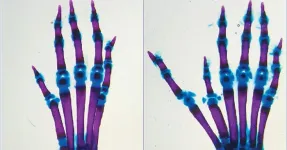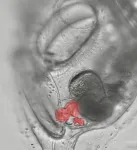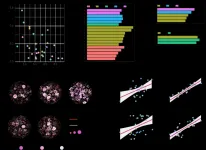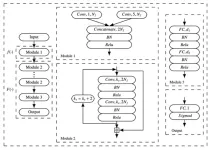(Press-News.org)
Our genomes provide the instructions for proper growth and development. Millions of genomic switches, known as enhancers, control the location and timing of gene expression, which in turn ensures the correct proteins are made in the right cells at the right time throughout our lives. New research from University of California San Diego Assistant Professor Emma Farley’s lab shows how we can now predict which single base-pair changes to the DNA within our genomes will alter these instructions and disrupt development, causing extra digits and hearts.
We now have genome sequences for over half a million people and counting. These genomes hold the key to how each of us comes to be and the promise of attaining precision medicine tailored to an individual’s own genetic makeup. Yet we cannot take full advantage of these datasets since we don’t understand a critical aspect of the genome: enhancers, which act as switches to control when and where our genes are expressed as proteins. Most genetic variants or mutations that cause disease lie within these enhancers. A central challenge has been to determine which sequence changes within enhancers matter and which do not. Thus far, pinpointing such causal enhancer variants has been akin to searching for a needle in a haystack.
Publishing in the journal Nature, the Farley lab has addressed this challenge by achieving the ability to predict which changes to enhancers would cause changes in gene expression across thousands of enhancers and cell types. This ability to predict causal enhancer variants is rooted in a deep understanding of how enhancers function. The researchers showed that enhancers activate gene expression by binding proteins known as transcription factors very weakly. Adhering to this rule ensures enhancers activate gene expression, and thus protein production, at the right level, place and time. The Farley lab found that single-letter changes to our genome that strengthen the interaction of an enhancer with a transcription factor cause enhancers to switch on gene expression inappropriately and make proteins at the wrong level, time and/or place. Therefore, these single-letter changes to the enhancer DNA within our genome have dramatic effects on the genetic instructions, leading to extra fingers in mice and humans.
The Farley lab identified three human families in which such mutations cause extra fingers and was able to predict which mutations would lead to even more fingers and more severe limb defects. Their ability to predict which enhancer variants will alter genomic instructions is not limited to limbs and generalizes to thousands of enhancers across cell types and species. In a complementary study published in Developmental Cell, the Farley lab showed that within marine animals known as sea squirts, single-letter changes that make heart enhancers stronger led to the development of a second beating heart.
Pinpointing enhancer variants that alter the instructions for development encoded in a genome is key for seizing the full potential of genomic data for improving human health and obtaining the goals of precision medicine. Across thousands of enhancers, the Farley lab found that searching for DNA base-pair changes that make enhancers stronger enabled (up to) a seven-fold increase in their ability to find causal enhancer variants.
“Our study illustrates a key vulnerability in our genomes: single base-pair changes that make transcription factors bind to an enhancer even slightly stronger can cause developmental defects,” said Farley, a faculty member in the Departments of Medicine (School of Medicine) and Molecular Biology (School of Biological Sciences). “Taking advantage of this knowledge will allow us to better predict which enhancer variants underlie disease in order to harness the full potential of our genomes for better human health.”
Farley is a recipient of the New Innovator Award and National Science Foundation CAREER Award, which funded this work. For the Nature paper, the first authors of this work are two UC San Diego graduate students, Fabian Lim (Biological Sciences) and Joe Solvason (Bioinformatics and Systems Biology), and postdoctoral scholar Genevieve Ryan. They were supported by Farley lab members: Sophia Le, Granton Jindal, Paige Steffen and Simran Jandu.
The Developmental Cell paper was authored by postdoc Granton Jindal, graduate students Alexis Bantle (Biological Sciences) and Joe Solvason (Bioinformatics and Systems Biology), Jessica Grudzien, Agnieszka D’Antonio-Chronowska, Fabian Lim, Sophia Le, Benjamin Song, Michelle Ragsac, Adam Klie, Reid Larsen Kelly Frazer and Emma Farley.
The research was funded by National Institutes of Health (DP2HG010013, T32HL007444, T32GM127235, T32GM133351, T32GM008666 and U01HL107442), National Science Foundation (2239957, CMMI1728497), American Heart Association (18POST34030077), UC San Diego Chancellor’s Research Excellence Scholars Program and California Institute for Regenerative Medicine (CIRM GC1R-06673-B).
END
One of the most common add-ons to IVF procedures undertaken in Australia and globally by infertile couples may be a waste of time as well as expensive and invasive, and maye even reduce the chances of success, according to a new report in The Lancet.
The research, by Monash University’s Professor Ben Mol in Australiaa and Dr. Rui Wang and colleagues in China, found that intracytoplasmic sperm injection (ICSI) whereby a single sperm is injected directly into a mature egg – originally developed in 1992 for couples with severe male infertility but which has since expanded ...
Males born to obese women are more likely to be overweight at birth and develop metabolic complications in later life, including liver disease and diabetes.
The way that male sex hormones activate pathways in the developing liver is partly to blame.
That’s the finding from a new study led by University of South Australia (UniSA) researchers looking at the impact of maternal obesity on fetal liver androgen signalling.
Male fetuses of obese pregnant women have different signals that are activated by male sex hormones in the liver, which encourages them to prioritise growth at the expense of their health.
UniSA researcher Dr Ashley Meakin ...
Understanding the responses of different rhizosphere microbial lineages to soil amendments during in situ remediation of Cd-contaminated soil is of great importance in the assessment of the restoration and crop health. This study demonstrates the distinct responses of rice rhizosphere microbial communities to soil amendment applications, highlighting the interactive associations between microbiomes, which is vital for enhancing our ability to develop effective strategies for sustainable soil management. The researchers' findings appeared December 4, 2023 in Soil Ecology Letters.
A series ...
Pulmonary malignancy is one of the most frequent and fatal cancers in older patients. Studies have shown that lung cancer patients have a high incidence of lower respiratory tract infections. This is due to the fact that these patients usually have airway obstruction, sticky sputum that is not easy to cough up, destruction of mucosal surfaces, and treatment with radiotherapy and chemotherapy. When most patients are found to have lung cancer, they have already developed distal metastasis and lost the chance of surgery, therefore, they usually choose to be treated with radiotherapy, chemotherapy, and targeted drugs. Radiotherapy and chemotherapy ...
Researchers at the University of Queensland have revealed the crucial role of saturated fatty acids in the brain’s consolidation of memories.
Dr Isaac Akefe from UQ’s Queensland Brain Institute has uncovered the molecular mechanism and identified the genes underlying the memory creation process, opening the door to a potential treatment for neurodegenerative disorders.
“We’ve shown previously that levels of saturated fatty acids increase in the brain during neuronal communication, but we ...
Deep learning has led to great improvements recently on a number of difficult tasks.
In CRYPTO 2019, Gohr innovatively integrated deep learning with differential cryptanalysis, specifically applied to Speck32/64, resulting in developing a neural distinguisher that outperforms the DDT-based distinguisher. Applying differential neural cryptanalysis methods to more cryptographic algorithms is an issue worth studying.
To solve the problems, a research team led by Liu ZHANG published their new research on 15 Dec 2023 in Frontiers of Computer Science co-published by Higher Education Press ...
Ottawa, ON, February 5, 2024 – Twenty-seven percent of individuals who had an emergency department visit for cannabis use developed a new anxiety disorder within three years, according to new research.
Led by researchers at the Bruyère Research Institute, University of Ottawa Department of Family Medicine, The Ottawa Hospital, and ICES, this is the largest study of the relationship between cannabis use and anxiety to date. The study published today in The Lancet’s open access journal eClinical Medicine included over 12 million individuals living in Ontario, Canada, between 2008 and 2019 who had never received a diagnosis or treatment for anxiety. The researchers ...
A Doppler ultrasound that measures the blood flow of small unborn babies can reveal whether or not the placenta is working properly. In case of repeated deviations from these Doppler measurements, additional monitoring of the unborn baby is necessary. These deviations indicate a higher risk of oxygen deficiency and other health problems for the baby. This study by Amsterdam UMC in collaboration with UMC Groningen and 17 other Dutch hospitals is published today in the British Journal of Obstetrics & Gynaecology.
Around 10% of unborn babies are classed as small for ...
A new species of pterosaur from specimens found on the Isle of Skye, Scotland, has been announced by scientists from the Natural History Museum, University of Bristol, University of Leicester, and University of Liverpool.
The new pterosaur is part of the Darwinoptera clade of pterosaurs. Its discovery shows that the clade was considerably more diverse than previously thought, and persisted for more than 25 million years, from the late Early Jurassic to the latest Jurassic. During this period species within the clade spread worldwide.
The discovery underpins a new and more complex model for the early evolution of pterosaurs.
The rarity of Middle Jurassic pterosaur ...
The influence of online vote advice tools designed to help voters discover more about candidates is limited when elections are affected by authoritarianism, a new study shows.
Voting advice applications offer voters nonpartisan information about political parties, candidates, and policy issues.
The research shows they could be an alternative source of information for those interested in learning about politics in democracies, but their use would be limited in authoritarian settings, particularly in the longer term.
In the short-term, and during highly competitive elections with tiny winning margins for candidates ...





